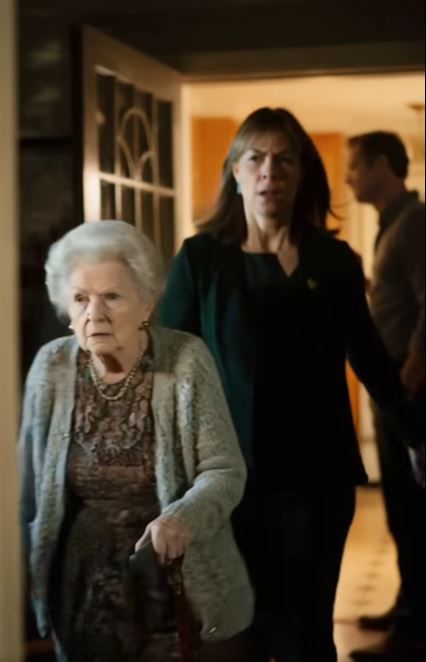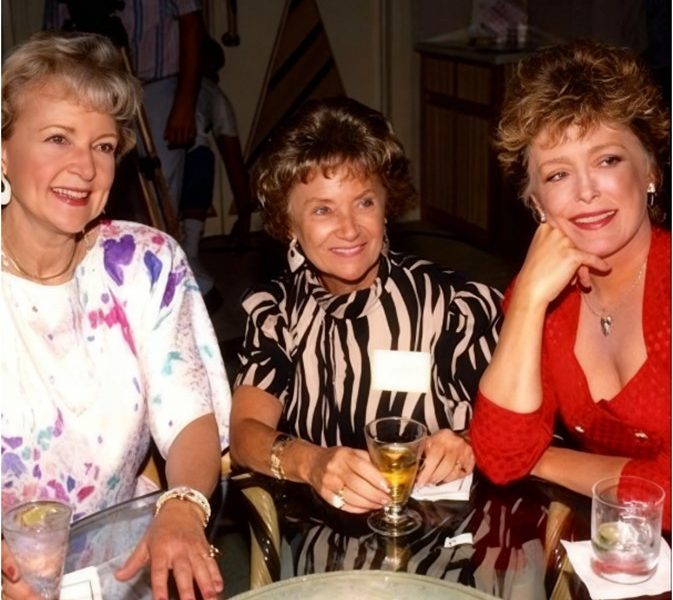The night I returned from the hospital was not supposed to happen. They had sent me away in an ambulance seven weeks earlier, convinced pneumonia would finish me off. My son, Daniel, even signed the release form with a trembling voice, hugging me like it was the last goodbye. I’d believed it, too. I’d made peace with death.
But death didn’t want me yet. And life had one more twist left for me.
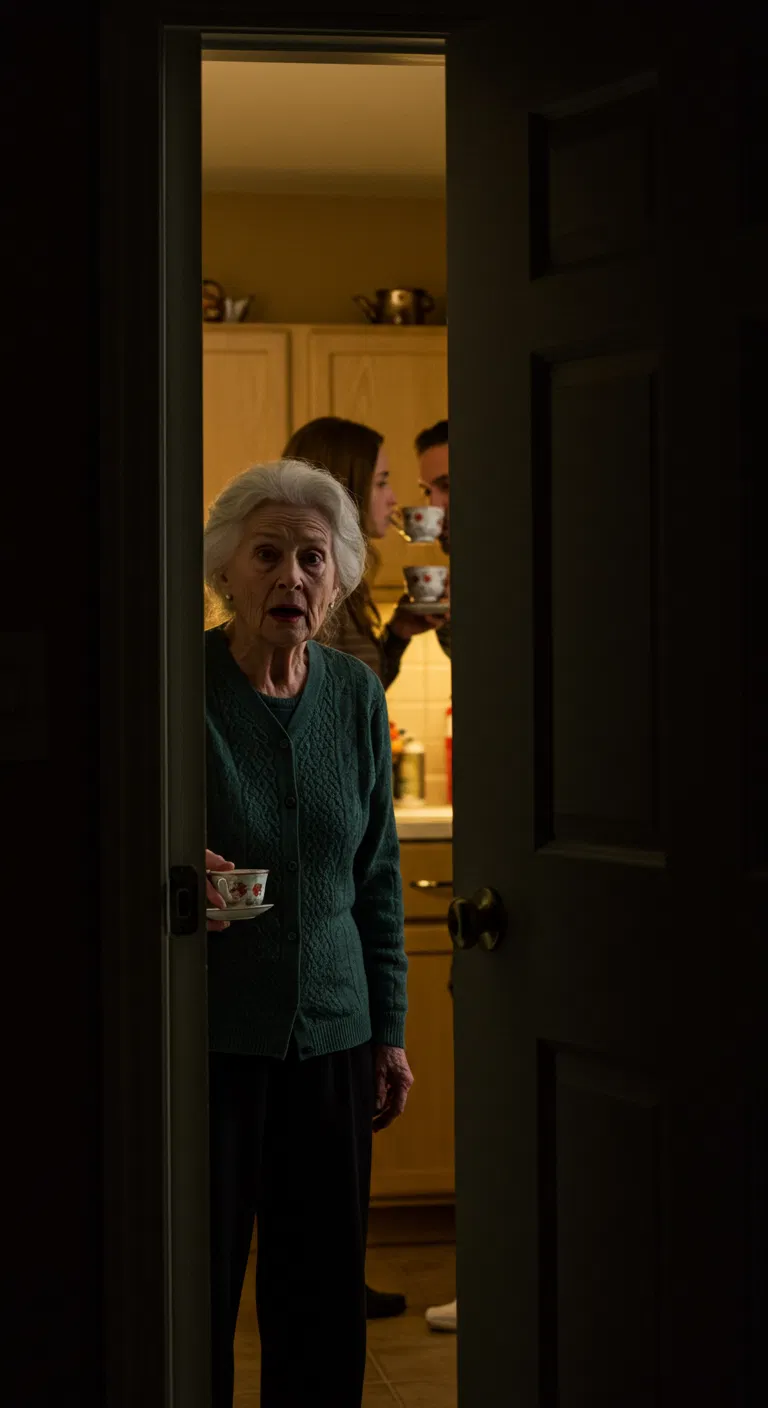
I wasn’t expected to come back that night. The rehabilitation center had arranged a quiet ride home. I didn’t want to alert anyone. I just wanted to sit on my own porch again, maybe smell my gardenias, hear the rustle of the wind in the big oak tree.
It was past 10:00 p.m. The taxi dropped me at the end of the driveway because the gate was locked. I walked slowly, my cane tapping against the gravel like a warning bell. The house lights were on. I smiled faintly, thinking I’d surprise Daniel and his wife, Janet. I imagined them crying tears of joy, calling me a miracle.
That’s what I expected. What I got was something else entirely.
As I pushed open the side door with a spare key I’d never returned, I paused when I heard voices. Not the television, not laughter. Just whispers. Something told me not to walk in just yet. Instead, I stood behind the half-open door, leaning against the wall, listening.
“So, the death certificate will say she passed in her sleep,” Janet whispered. “That’s clean. No questions.”
“But we need to be careful. One drop too much and…”
“She’s old, Daniel,” Janet said coldly. “It’s not going to take much. The sedatives are already in the tea blend. Once she drinks it, we wait. Two hours max, and the inheritance is ours.”
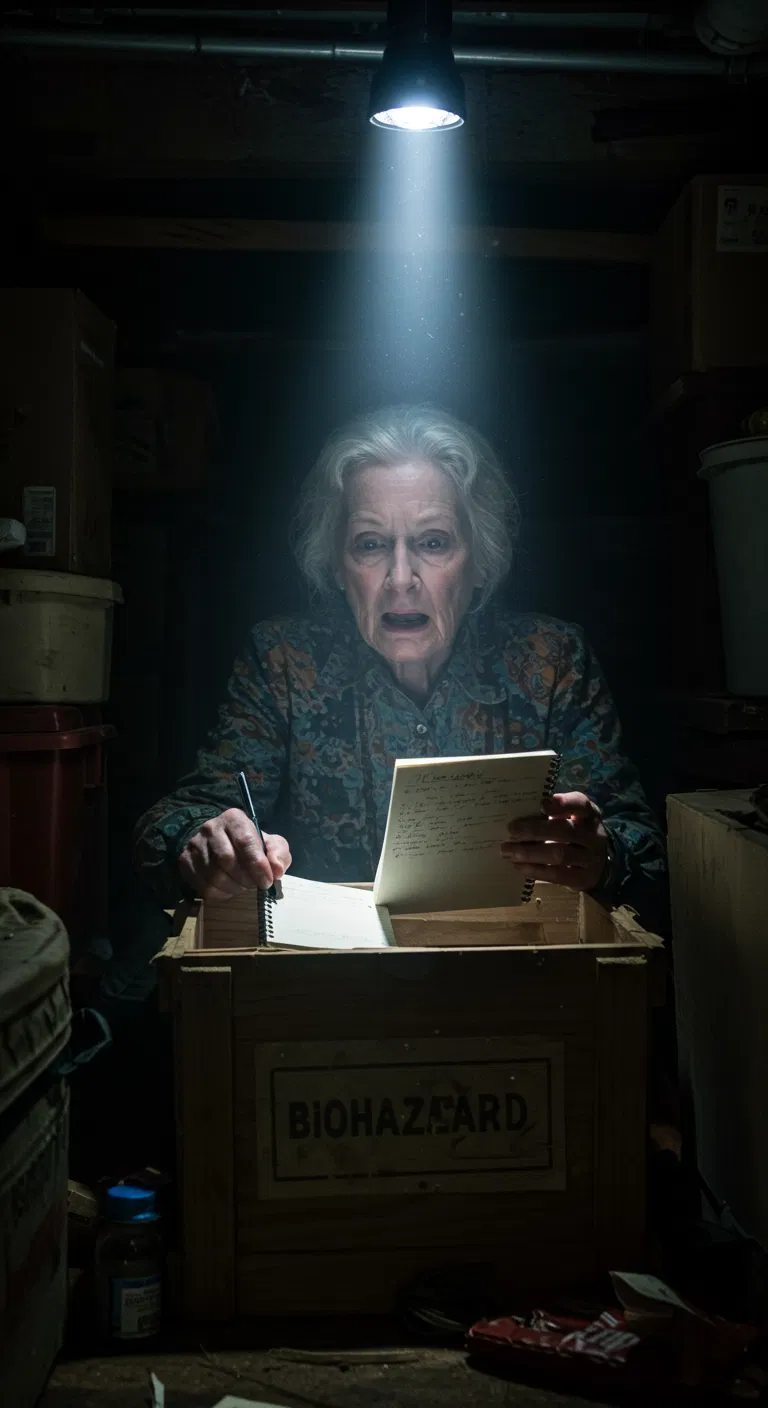
My breath caught in my throat. I wanted to scream, but nothing came out. My own son, my only son, was plotting to kill me for money. And his wife… she sounded like the mastermind. They believed I’d never come back, but now I was standing in their trap. And they had no idea I was listening.
What would you have done? Walk in and confront them? Call the police? Or hide and find out how deep the evil runs?
The day Daniel was born, I was only twenty-four and full of so much hope. My husband, Harold, and I lived in a small cottage just outside of Birmingham, Alabama. We didn’t have much, but we had each other. I gave up my career as a school teacher to raise him.
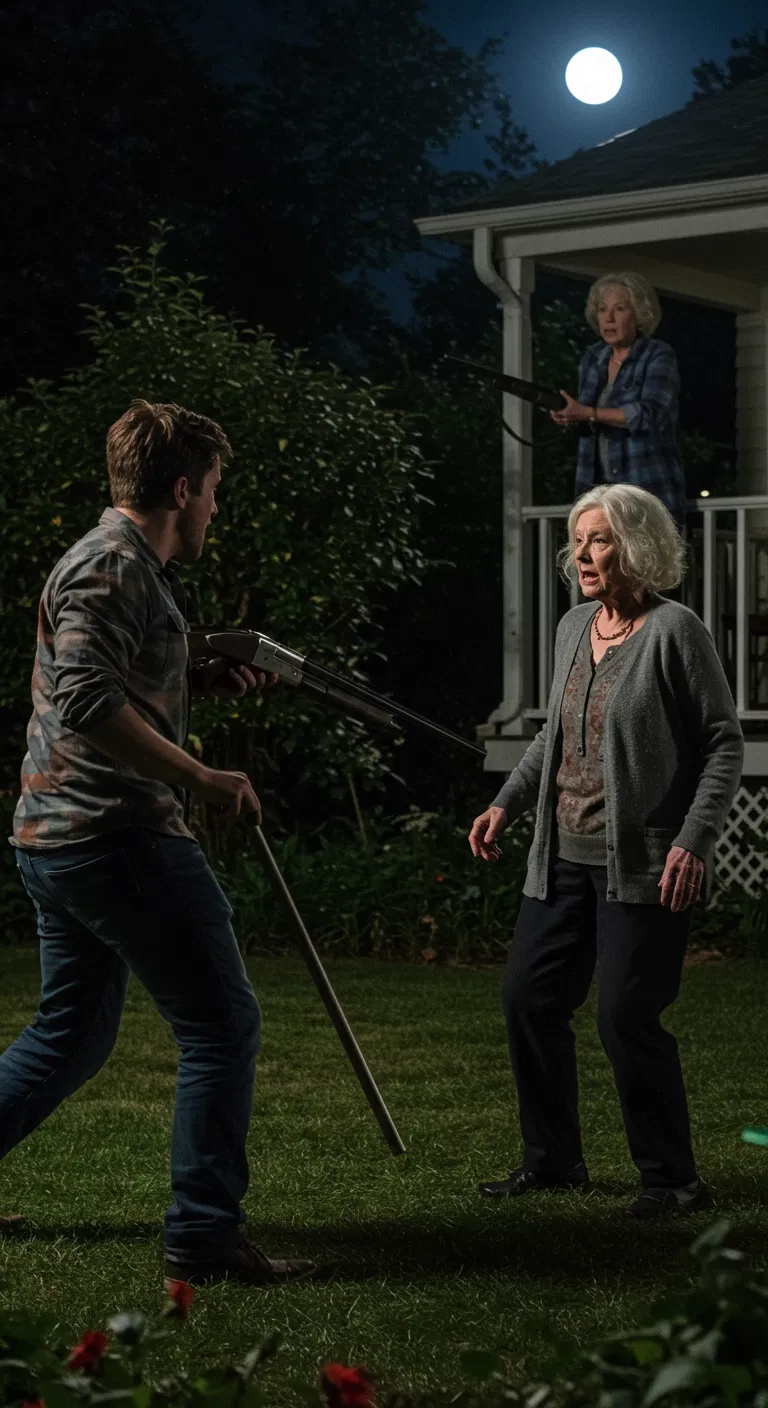
Harold died young, a heart attack on a warm spring morning. I was forty-seven. Daniel was just beginning college. From that moment, everything began to shift. He came home from college a different person—sharper, colder, more distant. He only asked about the house, the land deed, and if there was a life insurance policy.
When he married Janet, I hoped it would warm his heart. She was beautiful, sure, but always watching, never quite smiling. From the start, she treated me like I was some outdated piece of furniture. “Martha, the way you fold the laundry makes it smell stale.” I was still paying the mortgage on that house, yet I began to feel like a guest.
Three years ago, I finally signed the property over to Daniel. It was meant to be a gift, a symbol of trust. He hugged me and called me the most generous woman on earth. But from that moment, I wasn’t asked; I was instructed. “Don’t use that bathroom, Mom. It’s for guests.” “We’re having friends over, so maybe stay in your room.” My room, in the house I once built from scratch.
Then came the medication. I have arthritis and high blood pressure, but suddenly, my pill bottles were out of place. One would be missing, another switched. At first, I blamed myself. But one evening, I overheard Janet on the phone, whispering, “She’s so forgetful. It’ll be easy. We’ll just say she mixed it up herself.”
That night, I didn’t sleep. I realized something terrifying: I was being erased. Slowly, gently, carefully.
Then came the day they sent me away. Pneumonia. I remember holding Daniel’s hand, gasping for air, and he leaned down and whispered, “You’ll be all right, Mom. Just rest.” But when I was wheeled into the ambulance, I looked back, and I swear I saw relief on his face.
The hospital did their part. I fought like hell. And when I pulled through, they offered me time at a rehabilitation center. I agreed, hoping time apart would bring Daniel back to me. He didn’t visit. Not once. That’s when a nurse handed me a letter, sent by mistake, addressed to Daniel and Janet. Inside was an invoice from a law office: Request for confirmation of updated beneficiary. Ms. Martha Kingsley’s estate transfer request under consideration, pending death certificate.
They were declaring me half-dead before I was even cold. So, I made a plan. I waited until my breathing was steady, my legs were strong, and I could walk again. I called a taxi with what little money I had and made my way back to the house I once called home. And now, here I am, listening to my son and his wife plan my murder over chamomile tea.
I didn’t make a sound. I backed out quietly and slipped into the garden, my cane sinking softly into the soil I once tilled with Harold. I wasn’t just unwanted. I was disposable.
But they’d made one mistake. They thought I was already gone.
I needed time. If I made a scene, they’d have me carted off again, this time permanently. I walked to the shed, the one Harold and I built. I still had a key hidden beneath a stone frog. Inside was dust, cobwebs, and memories. But more importantly, it was safe. For now.
By sunrise, I had a plan. First, I needed proof. My words wouldn’t be enough. The world listens to the young, not the old, especially not the old women labeled “confused” when they start telling inconvenient truths.
I waited until the house was quiet. Janet had gone to her job. Daniel was upstairs. I crept to the side of the house, lifted the loose panel of the laundry window, and slid inside. I tiptoed to the pantry, grabbed crackers and a bottle of water, and tucked myself back out into the shed. But before I closed the door, something caught my eye: a folded tarp in the corner. I tugged it away and found a black duffel bag, heavy. I unzipped it. Stacks and stacks of hundred-dollar bills, along with a passport that didn’t belong to either of them. Forged name, ticket to Mexico, dated for next week.
They weren’t just planning to kill me. They were planning to vanish.
I returned to the house the next day like nothing had happened. Janet dropped her teacup when I walked in. Daniel stammered, “Mom, wh-what are you doing here?”
I smiled. “The doctor said I was well enough to come home. Didn’t they call you?”
Janet recovered first. “Of course they did. Must have slipped our minds. We’ve just been so busy preparing your room.”
I glanced at the tea kettle whistling in the kitchen. “You were making tea?”
Janet blinked. “Yes. Want a cup?”
I looked her dead in the eye. “Sure. But maybe I’ll make mine myself this time.”
That night, I poured the tea Janet brought me straight into the fern outside my window. In the morning, the plant was dead. Curious, isn’t it? How something meant to kill could give you life.
I started recording everything. I found an old recording device of Harold’s and tucked it in my robe. One night, I caught a gem. “Janet, are you sure it’ll work this time?” Daniel whispered.
“Yes,” she replied. “Tonight. He’s weak. Just needs one last cup. I’ll call the doctor in the morning, say it was natural.”
That was the proof I needed. But the real turning point came the night I followed Daniel into the basement. He always kept it locked. I watched from the staircase as he disappeared inside. Once he left, I grabbed the keys I’d stolen from his drawer and went down. What I found there—blueprints, legal documents, my death certificate already filled out, stamped, and backdated. They were already writing me out of existence. And in the corner, a crate labeled in big red letters: BIOHAZARD.
I opened it. And what was inside will haunt me forever.
The moment I pulled the lid off that crate, the air in the basement turned cold. A tangle of vials, syringes, and sealed silver packets. Each item labeled in Janet’s sharp, precise handwriting. At the center of it all sat a small notebook. I opened it. Pages of detailed instructions, dosage charts, names of sedatives, estimated timelines. On one page, I saw my own name: Martha K. 2.5 ml, oral. Within 3 hours, cardiac arrest expected.
I dropped the book like it burned. I quickly took photos with a small phone I’d hidden in my robe. For the next two days, I pretended like I knew nothing. Janet served me bland soup with a too-sweet smile. Daniel kept asking if I was sleeping well. I smiled back, nodded, gave them nothing. Let them believe I was still their puppet.
But every night, I was laying traps. I emailed the photos to a trusted friend from church, Elaine, a retired paralegal with a heart like a lion. The next morning, Daniel came into my room holding a new document. “Mom,” he said gently, “we need to get your affairs in order. You know, just in case.”
He slid the papers toward me. Pages of legal jargon I was never meant to understand. But I’d seen enough in that basement to know this was a weapon. They were trying to make it look like I signed everything away. I smiled. “You think of everything, Daniel.”
That day, I slipped the documents into my knitting bag and made my way to the garden. Elaine was waiting. She took one look at the papers and said, “They’re trying to declare you mentally unfit. Sign these, and they can put you away permanently.”
That night, I brewed my own tea and asked Janet to sit with me. I told her I wanted to make peace, that I was tired of fighting.
“We just want what’s best for you,” she said, taking my hand. “You’ve lived a long, good life, Martha. It’s okay to let go.”
From the hallway, I saw Daniel watching us. Hook, line, and sinker.
The next evening, I played weak. I even knocked over my cane. Janet rushed over. “You poor thing,” she said. “Maybe it’s time we help ease your suffering. You deserve to rest.” The monster was finally revealing its full face. I recorded it all.
The next day, I told them I wanted to sign the will, but only in front of a notary. They hesitated, then agreed, thinking they had finally won. They didn’t know the notary would be Elaine, in disguise. She arrived that evening. Daniel looked nervous. Janet kept checking her watch.
But just before I lifted the pen, I paused. “You know,” I said softly, “it’s funny. You both have such different handwriting.”
Janet blinked. “What?”
I looked her in the eye. “The handwriting in the basement is yours. The poison logs, the death certificates. You might want to fix that in the future.”
Silence. Daniel stood. “What are you talking about?”
Elaine stood, too. “We’ve got everything, Mr. Kingsley. The recordings, the documents, and the poison stash. You’re finished.”
Their faces. I’ll never forget it. Janet lunged for my phone. Elaine stepped between us. Daniel backed into the hallway, muttering, “This wasn’t how it was supposed to go.”
But it did. Exactly how I planned it. Elaine made the call. Police were en route. But before they arrived, Daniel made one last desperate move. He ran out the back door, toward the basement. When the cops came, they found Janet frozen in the kitchen, crying. But Daniel… he wasn’t anywhere to be found. At least, not yet.
The police arrived in a flurry of blue lights. “There’s a lot down there,” the sergeant said, her voice low, after emerging from the basement. “Your son’s been planning this for a long time, ma’am. Forged IDs, hidden cash, medical records that aren’t yours. And under the stairs… a sleeping bag, food wrappers. Looks like someone’s been hiding down there. Recently.”
My stomach twisted. Janet gasped from the kitchen. “He was going to leave me behind,” she whispered.
They took her away quietly. But Daniel was still out there.
Three days later, I was outside watering my marigolds when I heard a twig snap. There he was. Disheveled, dirty, wild. “Mom,” he said, stepping forward, a metal pipe in his hand.
I didn’t move. “You told them everything,” he muttered.
“I did what any mother would do when her life is being hunted.”
“They’ll believe me, Mom. I’ll say you’re confused. Old. I’ll say you hit Janet.”
I reached behind me and pressed the small button on the recorder in my apron. “Say it louder,” I said. “Say it all.”
He paused, eyes narrowing. “You think you’re clever?”
“I think I survived,” I whispered. “And that makes me dangerous.”
Suddenly, he lunged. But before he could reach me, a sharp crack rang through the air. Elaine stepped from the porch, holding my old shotgun. Her hands didn’t tremble. “Don’t move,” she said calmly.
The police arrived minutes later. As they cuffed him, he screamed, “You’ll regret this, old woman! That house should have been mine! You were supposed to die!”
And that’s when I finally broke. I stepped forward, looked him dead in the eye. “I did die, Daniel. The day you stopped being my son.”
The verdict was unanimous. Guilty on all counts. But I wasn’t done. The next morning, I called the press. I told my story on camera, in detail. It went viral. Other elders came forward. Laws were proposed. Daniel and Janet’s “House of Horrors” became a landmark case.
But just when I thought the story was finally over, an officer approached me outside the courthouse. He handed me a sealed envelope. No return address. Inside was a note, one sentence: The house isn’t done telling its secrets.
I should have thrown it away. But I knew better. That night, I retraced every step in that house. And then it hit me. The attic. Harold’s attic. He always kept it locked. “Just old tools and man things,” he’d said. For fifty years, I respected that boundary.
I found the key and climbed the narrow stairs. It wasn’t just an attic. It was a vault. Old file cabinets, stacks of ledgers, a trunk with Harold’s initials. And in the corner, a small safe I had never seen. Inside the trunk were letters Harold had written but never sent.
Martha, if you’re reading this, I failed to protect you. I never wanted to bring this into our home, but I had no choice. They threatened you. They threatened Daniel.
He wrote about a group of former business partners who were laundering money through local construction jobs. When he realized what he was involved in, it was too late. Backing out meant risking our lives. He mentioned Janet’s father.
I tried to cut ties with Lawrence Miller, but he came back years later. Said his daughter was getting close to Daniel. Wanted to marry in. Said it would tie things up, secure the family.
Janet hadn’t just married Daniel by chance. Her father had orchestrated it. Their marriage wasn’t love. It was leverage.
The safe held a black journal. Harold’s handwriting, front to back. Every transaction, every threat. Clipped to the last page was a death certificate: Lawrence Miller. But the date was four years after Janet told us he had died in a car accident.
I stared at the attic wall and whispered, “How deep does this go?”
The trial took another turn. Daniel, already behind bars, now faced new charges: money laundering, conspiracy, racketeering. Janet was declared mentally competent and ordered to stand trial. The house, my house, had hidden an empire of lies. But now, it was all burning. And when the final hearing came, I stood once more in that courtroom.
“I was almost buried in that house,” I told them, “first by the people I trusted, and then by the secrets they left behind. But I chose to dig. And now, no one else has to.”
Daniel was sentenced to life. Janet received thirty years without parole. And I… I finally sold the house. Moved into a quiet cottage near the lake. Small place, sunlight in every room, no secrets in the walls. And I tell myself, you were never weak. They were just afraid of your strength.
